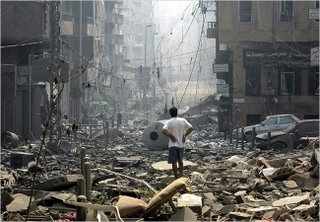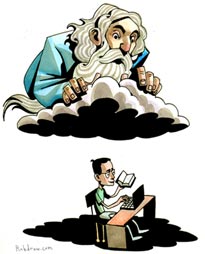Friday, July 28, 2006
I posted a short entry at “The Film Snob” that might also interest my readers here. Curious about the torturous gauntlet that is finding an apartment in New York City? Click here.
Wednesday, July 26, 2006
Rick's Pilgrimage


I don't often recommend blogs outright, usually preferring to slip them into the "Links" section and let you find them by accident or serendipity. But I've so been enjoying a particular blog that I had to make you aware of it.
"Where in the World" is the brand spanking new travel blog by my co-worker and friend, Rick, who saved up God-knows-how-much money, told us all about a month ago that he was taking a sabbatical, and now finds himself crawling all over Asia and Europe for almost four months!
He regularly posts pictures and fascinating, well-written impressions about his time abroad that I just had to share.
Enjoy!
Tuesday, July 25, 2006
The Circle of Life

Death...and birth have been on my mind a lot lately.
I spent the weekend in Decorah, Iowa at the funeral of Olivia Schlee, my wife's last remaining grandparent; over the course of the last four years, Stephanie has lost all of her grandparents. With 8 kids, 22 grandkids and 35 great-grandkids, not to mention other family members and friends, hundreds of people were on hand to pay their final respects to this incredible woman.
I couldn't help but realize, at I stood beside the casket with my wife, that I have not yet had to face death. Not like this. Aside from the death of my father's father when I was too young to remember, I haven't lost any of my beloved grandparents. I do not yet know the pain of losing a family member so close and so dear to my heart. To be sure, I've lost wonderful great-aunts and uncles, but never those in my immediate circle. Oddly enough, almost all of those who've died in my life have been high school friends--three at last count. It's a sobering thing to reflect on the mortality of others which inevitably leads to musings on your own lack of invincibility.
But I couldn't dwell on death for too long. Life doesn't really let you. It insists on revealing a larger picture--one of death and rebirth. You see, less than 24 hours after Olivia Schlee was laid to rest, my sister-in-law went into labor. And this morning, I awoke to discover that I was the proud uncle of Aaliyah Megumi, a seven pound, four ounce baby girl born to my younger brother, Jonathan and his wife, Shino in Okinawa, Japan. I spoke to Jonathan this morning. He has not yet been able to get his mind around the enormity of the event (he is the first of us siblings to have a child) though I am sure his heart will produce some appropriate words soon enough.
The circle of life. From weeping comes rejoicing. In the midst of sorrow comes joy. From despair, hope is born.
Goodbye dear Olivia. You were loved by your family and friends beyond all reckoning.
Hello sweet Aaliyah. Our adoration of you is just beginning.


Friday, July 21, 2006
If God Is For You, Who Can Be Against You?

In a tragic and soul-eating image of teaching hate, Israeli children are invited to write messages to Hezbollah on shells ready to be fired against targets in southern Lebanon.
I was raised in a Christian culture that taught that Israel can do no wrong, a viewpoint that always struck me as ironic and misguided seeing as how the Old Testament is nothing but the ancient Hebrews going astray and having to be corralled back onto the right path by God. They may be God's chosen people, but the Scriptures prove how wayward and wicked even the elect can be.
What I am about to say will no doubt earn me the ire and wrath of many of my conservative, evangelical friends, but then, if I was constantly worried about that, I'd have to shut this blog down. It may even strike some as anti-Semitic; if that is the case, it means you are looking for boogiemen, where, I assure you, none exist. But it's time we stop writing Israel blank checks just because they are characters in our idea of the end of the world.
Frankly, I am tired of Israel setting the world on fire and then playing the victim card.
There is no doubt that she is one of the most oppressed, harassed and maligned countries on the planet. And there is no doubt that her abuse—whether as a nationalistic state or a loose and scattered band of tribes—goes back nearly to the dawn of time itself. I am not unaware of nor indifferent to the Jewish people's plight.
And yet, I cannot abide what she has become through the crucible of fire.
Israel claims that the land they now occupy is theirs by birthright. They claim that God gave them that land since the dawn of creation and it was only through the barbaric atrocities of occupying and captive-taking armies down through time that dispersed their people.
I happen to agree with them.
But at the same time, the argument that the state of Israel is entitled to the land as a result of God's decree is the excuse of a thousand petty and brutal tyrants throughout history.
If God is for you, who can be against you?
If possession is nine-tenths of the law, then Israel no longer has claim to their narrow stretch of rock in the middle east. While no one could fault them for wanting to return to the land of their ancestors, they returned, in 1948, to a land that had been occupied already for hundreds of years. And not by them. Instead of setting up a country that attempted to co-habitat with their neighbors, the new Israeli state pushed the inhabitants aside and took what they claimed was rightfully theirs. And we wonder why the Palestinians are angry?
Granted, the Muslim states surrounding Israel on all sides would like nothing more than its destruction. (Some have gone to great lengths to hold out the hand of friendship, or, in the very least, live peaceably alongside their Jewish neighbors.) This and their historical maltreatment at the hands of the world have made Israel into a state in which violence is the lifeblood that pumps through its veins. Rather than abhor violence because of living through so much of it (example: Japan), Israel's creed seems to be one of endless and ceaseless retaliation. Vengeance is a national identity.
Just over two weeks ago, provoked by a Hamas kidnapping of an Israeli serviceman, Israel invaded the northern Gaza Strip and destroyed a significant portion of Gaza's infrastructure. A few days later when the Syrian-backed terror group Hezbollah used the ensuing confusion to raid northern Israel and capture two Israeli soldiers, Israel responded in typical fashion. They initiated a massive attack on Lebanon's civilian structures, obliterating the Beirut airport, apartment complexes, bridges, power stations, medical facilities, civilian buses, and even a dairy factory. Hezbollah has retaliated by raining down rockets into Israeli neighborhoods. While there have been civilian casualties on both sides, dozens have perished in Israel to Lebanon's hundreds. The death toll in Lebanon is tenfold that in Israel.
Obviously, the fact that Hezbollah is a terrorist organization with legitimate tentacles in Lebanon’s coalition government complicates matters. The government is either unwilling or unable to stop them. In essence, Hezbollah controls much of the southern part of the country, armed with weaponry as good as the army itself. Worse, Hezbollah is sponsored and bankrolled by Syria and Iran. (Have the Lebanese so quickly forgotten about the assassination of their leader just over a year ago and Syria’s finger on the trigger? Does Hezbollah seriously think that Syria is not furthering its own interests--interests that that do not, in the end, give a damn about Lebanon--or is it too blinded by its hatred of Israel?)
Israel's default to violence is troubling (not the least of which because it seems to be this nation’s default response when attacked as well) and raises many ethical questions. Yes, a country has the right to defend itself, but does a need for national security warrant such a massively disproportionate response to an act of terror? Can the collective punishment of an entire population be justified? Surely Israel’s right to self-defense does not exempt it from respecting international law and basic human decency. And surely international law does not look favorably on one sovereign country attacking another. Is Israel making the middle east safer? Surely one must ask the question. Are Israel’s actions making their own country and the region safer by razing Lebanon?



The Israeli air strikes have created a humanitarian crisis, displacing over half a million fleeing civilian refugees and killing hundreds. Beirut, just recovering from decades of internal abuse, is being torn to shreds. Israel has crossed the border in several skirmishes already and has hinted that it is preparing for a full out ground invasion. There is little doubt that the attacks could be the fatal blow to Lebanon's fragile and fledgling democracy. Its infrastructure, painstakingly rebuilt after decades of civil war and occupation has been set back half a century.
Violence has never created friends, only emboldened enemies. Razing city blocks, destroying material supply lines, and vaporizing men, women and children does not create goodwill. It fosters hatred. And it encourages retaliation. History has proven that whenever you attempt to destroy evil with evil, something far stronger and far nastier usually rises in its place. Tit for tat is something children employ at recess, not world leaders on a global stage. So long as this is the case, there will never be peace in the middle east. All Israel is doing is creating future “terrorists” with an undying hatred of Israel in their hearts.
This is not to say that the abhorrent actions of Hezbollah and Hamas should be unequivocally condemned and opposed and even rooted out and destroyed. That these two organizations exist to wipe Israel from the map cannot be ignored. However, while their intentions are obviously malevolent in nature, they do not, in and of themselves, represent nations. Neither do they possess anywhere near the military capability of their foes.
Israel wields one of the most powerful militaries in the world. How is this possible? More than $3 billion per year from the United States might have something to do with it.
If America is for you, who can be against you?
The U.S. and the world in general are letting Israel get away with murder. They are committing acts we would never tolerate from another country. Because Israel is the only stable and friendly democracy in the middle east, a region in which we desperately need a foothold in order to maintain the flow of oil, the U.S. is willing to turn a blind eye to the atrocities.
Once again, a rift is opening up between the policies of the United States and those of her European allies. The Bush administration is giving Israel a tacit green light to take the time it needs to neutralize Hezbollah. The E.U., on the other hand, fears mounting civilian casualties will play into the hands of militants and weaken Lebanon's democratically elected government. Not to mention, add fuel to an already hotly burning fire of Islamic discontent. I agree.
Syria supplies Hezbolah with weaponry, the U.S. supplies Israel with the same. What Syria and Iran are to Hezbollah, the U.S. is to Israel -- the puppet masters.
The right to defend yourself does not apply to the wholesale slaughter of civilians. Yes, in war there will be collateral damage--the cold and callous military-speak for civilian casualties--but this is not a war, this is not warranted and this is sure as hell not a proportional response. Make no mistake, these are war crimes. This is the butchering of a nation.
We cannot ignore terrorism. Be it in the form of suicide bombings on Tel Aviv buses or those buried in the rubble created by Israeli bombs. Hamas and Hezbollah are not the only ones responsible for wielding campaigns of terror--regional superpower, state sanctioned terror is no less condemnable. The time has come to resist evil wherever it rears its ugly head—in the mosque or in the synagogue.
Thursday, July 20, 2006
If God Blogged...

Surfing around online for something to read but nothing has caught your eye? Try Slate. "Try Slate" is great advice for most any occasion, but in the context of this post, I am specifically referring to Slate's "Blogging the Bible."
Writer David Plotz, who describes himself as a "proud Jew, but never a terribly observant one" found himself at a rare visit to synagogue recently and sat through the service both confused and bored. Trying to stay awake, he reached into the pew-back in front of him, snatched up the Torah, opened it at random and began reading.
He soon found himself engrossed in a story he'd never read before and couldn't put down. Not only was it a fascinating read, but at first glance it seemed to directly contradict things he'd been taught as a child. What was going on?
While he assumed he knew most of the Bible, especially its more colorful parts, it turned out he was ignorant of much of the Scripture. I doubt he is alone in that assumption. His ignorance rattled him. If just one story unsettled him so much, what else was in there that he'd missed? Plotx decided to revisit the Bible, his first time as an adult. And to blog about it as he went along.
He's not blogging with the intent to offend, or look for ways to insult those who look upon the Bible with utmost reverence. He doesn't feel his comments are necessarily wise and insightful. He simply wants to "find out what happens when an ignorant person actually reads the book on which his religion is based."
His observations are both challenging and hilarious, sacred and occasionally profane. But they are always honest. And they are always interesting. What he reads moves him, stumps him, humors him, horrifies him and encourages him. Sort of what happens when I read it too.
Check it out his opening comments here and the first of his installments here.
Tuesday, July 18, 2006
Monday, July 17, 2006
Monday, July 10, 2006
My Cup Runneth Over

When I lived in Italy, I used to sit on the balcony of my apartment and just watch the children play soccer in the courtyard below me. Their play was joyous and buoyant. They had no proper field or goals but that didn't stop them from channeling their heroes and creating a rivalry for the ages out of thin air. It was as if my pitiful cheering somehow morphed into the roar of thousands of fans.
I bought them a soccer ball once. It was smooth and shiny and I wanted to replace their old, half-inflated, gnarled ball. Coming home the next day, I stumbled across the ball I'd given them. It was beaten, nicked and bruised. It looked little better than the one it replaced. At first I was disappointed. I'd hoped they'd take better care of it. And then I realized that every gouge, every scrape, every nick was a sign of their love for the ball, their sport, and my gift. To have sat off to the side, glistening new and unused, would have been the insult.
You'd think that their infectious love of European football would have caught on with me. And while soccer certainly held a higher profile in my mind from that time forward, it wasn't until I moved back to America and met my wife that soccer became an every-day part of my life. Marrying a rabid defensive sweeper who plays weekly will do that for you.
I'd never watched World Cup soccer before. For the last five weeks it’s almost all I’ve done. Be it in my own living room, others’ dens, a resort lounge, a pub--wherever a TV could be found, we were watching. And I began to understand just what it is about the game that so enthralls the entire world, other than my own myopic country.
The stamina and athleticism is second to none. The ball control borders on telekinesis. The grace is superlative. The tension, majestic. The acting, Oscar-caliber.
I loved watching teams like Ghana, who in the eyes of many shouldn't have even been there in the first place, battle their way to wins over far superior forces. I loved watching America hit the field valiantly but realize very quickly that it will be decades, if ever, before we are able to seriously compete. I loved watching the German fans give their home team a close-out welcome that would have made any onlooker think they’d won it all. I loved being witness to the shocking surprises that inevitably arise such as dominant favorite Brazil humbled or soccer celebrity Zinedine Zidane’s self-destruction.
And of course, I loved watching the final match between the two deserving titans, France and Italy. Suddenly the Berlin Olympic stadium melted away and I was once again up there, on that balcony. Bodies surged, spun and dove. Foreign voices punctuated the air. People cheered. This time the bodies were larger, the field far greener and the ball always immaculate, but in my eyes they were still just my neighborhood kids slugging it out.
I don’t recall that those kids ever really kept score. At the end of the night, when their mothers called them home, they all left the field winners. Kind of like tonight.
Congratulations Italia! You are the World Cup Champions! Fantastico!
Sunday, July 09, 2006
The Empire Strikes Back

Sure, there was BBQ. And fireworks. But what affected me most this fourth of July was what I did before the festivities ever began. Sitting down to review a film for DVDFanatic, I instead witnessed a polemic that colored everything else in which I participated that day (no, it wasn't the above Team America: World Police, although that is a fine film) and would continue to haunt me days later.
* * *
In Steven Spielberg's Oscar-winning masterpiece, Shindler's List, Liam Neeson shares a dance with his estranged wife in a posh club. Last she saw him, he was a struggling business man. Now he is wealthy beyond either of their wildest dreams. How, she wonders, did he amass this wealth.
“There's no way I could have known this before, but there was always something missing,” he muses. “In every business I tried, I see now it wasn’t me that was failing, it was this thing, this missing thing. Even if I’d known what it was, there’s nothing I could have done about it, because you can’t create this sort of thing. And it makes all the difference in the world between success and failure.”
“Luck?” his wife asks.
“War,” he proclaims.
* * *
On January 11th, 1961, Dwight D. Eisenhower delivered his final address as President of the United States. Customarily a time to reflect on an administration's successes, Eisenhower instead chose to use his last minutes before the American people to pass on a grave warning:
“Beware the military-industrial complex.”
In an extraordinary clarion call, this man who rose to become the most powerful military general in the country before going on to become President, warned his fellow countrymen that they ignored the rise of militarism in America at their own peril.
Eisenhower's words echo throughout the documentary, Why We Fight, a shell-shock of a film that uses the President's final address as a backbone of the film. Eisenhower feared the very entity that had sustained and groomed him throughout his life and felt that the money and focus lavished on the country's fighting forces was obscene when Americans' basic needs were going unmet.
Director Eugene Jarecki makes the link between Eisenhower's America and George W. Bush's America with shocking ease. But don't mistake this for a partisan attack piece. Far from it. Jarecki faults Democrats and Republicans alike and admittedly holds up Eisenhower, a two-term Republican as his paradigm. Jarecki is not after parties. He is after what he and many others see as a debilitating cancer eating away at the body politic.
What, the film literally asks, is this country fighting for? The robotic reply is always the same-—freedom. Really? Jarecki refuses to settle for pat answers. Whose freedom are we fighting for? Certainly not ours. The Iraqis? Sure, as a reason, it’s been given...but only long after the ruse of WMD's rang hauntingly hollow.
Jarecki is concerned that we always dip our wars in sweet tasting words like Liberty and Freedom. We wrap the flag around all our actions. It's far easier to say we must vanquish the evildoers than to ask the hard questions such as, did we do anything to bring this upon ourselves?
The CIA has a term which has gained prominence since 9/11: Blowback. Put simply, Blowback is the unintended consequences of foreign operations kept secret from the American public. These operations are kept secret so that when the retaliation comes, people will not be able to put it in context, connect the dots, or place cause beside effect.
Perhaps we could connect the dots if only we didn’t live in the “United States of Amnesia” as interviewee Gore Vidal states both humorously and incisively.
The United States of America has propped up dictators, assassinated heads of state, initiated wars, intervened in the sovereign affairs of other nations, and overthrown entire countries. Nearly every presidency has felt the need to commit unilateral acts to protect its own interests: Guatemala, Philippines, Laos, Lebanon, Grenada, Panama, The Congo, Brazil, just to name a select few.
Today’s demon is yesterday’s friend. We have aided and encouraged the most brutal regimes, all to maintain our interests. Ironically, these same regimes have a predictable pattern of soon biting the hand that feeds them.
“The United States is the greatest force for good in the world.” John McCain says in an interview. “We have an obligation to spread democracy throughout the world.”
Is that what we're doing, Jarecki asks with this film? Democracy at the point of a bayonet? Save the world by taking it over? It doesn’t begin with the gun. First, we employ economic colonialism. We only use our guns when other counties fail to see it our way.
Capitalism is winning...at the expense of democracy.
When does America go from a force for good to a force for imperialism? Make no mistake, the film argues, while the shape may be different than those in the past, we are an empire.
In his farewell address, George Washington (noticing a theme?) warned of the danger of maintaining a standing army. He did not want the fledgling country to become like that of the Roman empire. In order to maintain what we have--the power, the clout, the prestige, the resources, the way of life--we must have standing armies and bases in foreign countries to put them on. Controlling our own land is not enough, we must be able to control the world. To do so, we must be it’s sole superpower.
We say we don’t use our military for conquest or domination. Don’t we, Jarecki asks? We have over 700 bases on every continent except Antarctica. Our garrisons encircle the planet. We currently occupy or squat in large parts of the Middle East--the lifeblood of our country’s energy.
Oil is indispensable. The U.S. consumes more oil than any other country. When you run out of it, your country...your army stops. And an army cannot be allowed to stop...not when it is this profitable.
We live in an era of permanent militarization. It was not always this way. Understandably, this country had to rise to meet the challenge of WWII. However, at the war’s end, instead of returning to our previous state of readiness, we maintained our full military might. After all, the iron curtain loomed.
Today, the U.S. spends more on defense than all other nations combined. The defense budget is far and away the largest portion of the national fiscal pie. This alone should be enough to give us pause. The thing that is truly disturbing, Why We Fight argues, is that our military is run, not for what benefits the country, but for what benefits defense corporations. Here’s where the film’s rubber meets the road. The Pentagon and military contractors are unquestionably in bed with one another other.
It is, quite simply, legalized corruption according to Jarecki.
And as their technology advances, the true state of warfare is lost--a reality made all the horrifying in the house to house battles in Baghdad. Technology has turned war into a video game where the enemy is not human beings, but objects on a computer screen.
The Military Industrial Complex is four fold, we are told-—the Military, the civilian Defense Industry, the Congress and the think-tanks. More than at any other time in our history, the people making the decisions and implementing policy have absolutely no accountability to the voter. (The country even elected a government contractor as Vice-President.)
All the while, these contractors are taking in billions of dollars in profits, profits paid by taxpayers. When war is this profitable, you’re going to see more of it. You will, if necessary, invent reasons to go to or maintain war.
Remember when the whole world, even the Arab world, was behind us, mourned beside us, was horrified along with us. How quickly we squandered that goodwill. Now thousands are dying, billions are being spent, and animosity and hatred against us is greater than it has ever been. What happened?
In it’s boldest, though hardly groundbreaking assertions, Why We Fight postulates that post 9/11 was used as an excuse for a very calculated and pre-developed foreign policy of world domination. It is established that the National Security Team discussed a preemptive strike on Iraq the day after the World Trade Center towers fell. Not that there was a shred of proof Iraq was involved. Not that there is a shred of proof nearly 6 years later.
Iraqi exit strategy? What exit strategy? There’s no need for an exit strategy when you never intend on leaving.
We may not like to think of ourselves as a militaristic nation, but if the shoe fits, we are doomed to wear it. What’s a few thousand dead kids if defense contractors are able to pad their purses?
We have been lied to in every major military escapade over the last 50 years, the film says. As a result, we live in very different, much more skeptical America than that of our recent ancestors. The country has never been so divided. No one knows who to believe or trust. Ask five people about the reasons we are at war and you will get five different answers. It used to be that if the military bugle called, you responded, without question, to defend your country. Today, when truth is hidden beneath a veneer of slick and patriotic lies, that response is not so immediate.
One retired Lt. Colonel who plays a prominent part in the film remarks, “I will not allow any of my children to serve in the United States military. If you join the military now, you are not defending the United States of America...you are helping certain policy makers pursue an imperial agenda.”
Wake up, this film chides. We have all failed to ask the right questions or hold anyone accountable. The price of liberty is eternal vigilance. And we have not and are not being vigilant.
Nowhere is it written that America will go on forever.
A View From Space

Stephanie's boss wrote a great article in today's Denver Post about space flight being a venture well worth humanity's risk.
Check it out here.
Friday, July 07, 2006
Look! Up in the sky! It's a bird, it's a plane, it's...
(Click on any of the photos for larger views)

The Astronaut van, with the crew aboard, waits beside the Vehicle Assembly Building (VAB)

Ignition

Launch

Up, up and away!

Stephanie poses with NASA Administrator Mike Griffin

Stephanie with last year's shuttle commander, Eileen Collins, the first woman to pilot the Space Shuttle

The Astronaut van, with the crew aboard, waits beside the Vehicle Assembly Building (VAB)

Ignition

Launch

Up, up and away!

Stephanie poses with NASA Administrator Mike Griffin

Stephanie with last year's shuttle commander, Eileen Collins, the first woman to pilot the Space Shuttle






